Strategic Issues and Strategies for Qantas Airways: A Detailed Report
VerifiedAdded on 2023/06/08
|5
|922
|326
Report
AI Summary
This report provides a strategic analysis of Qantas Airways, an Australian airline, focusing on key issues impacting its operations. It uses the PESTEL model to analyze political, economic, social, technological, ecological, and legal factors affecting the airline industry. The analysis identifies both opportunities and threats, such as government regulations, economic fluctuations, technological advancements, and environmental concerns. The report emphasizes the importance of strategic analysis for organizational management, enabling companies to understand and address challenges to achieve their goals. Ultimately, the report underscores the need for Qantas to carefully consider these macro-environmental factors to ensure its future success in the competitive airline industry. Desklib offers a variety of resources, including past papers and solved assignments, to support students in their academic endeavors.
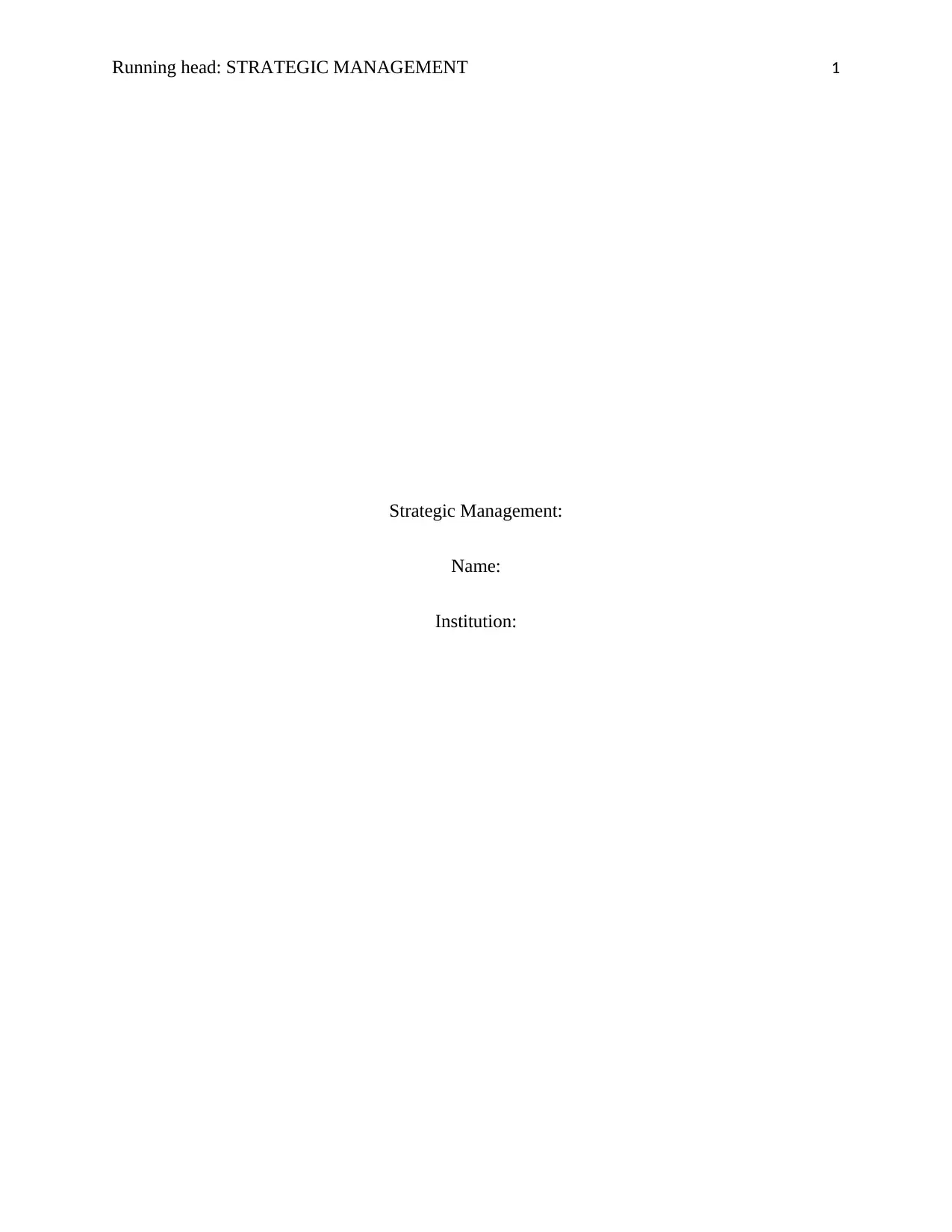
Running head: STRATEGIC MANAGEMENT 1
Strategic Management:
Name:
Institution:
Strategic Management:
Name:
Institution:
Paraphrase This Document
Need a fresh take? Get an instant paraphrase of this document with our AI Paraphraser
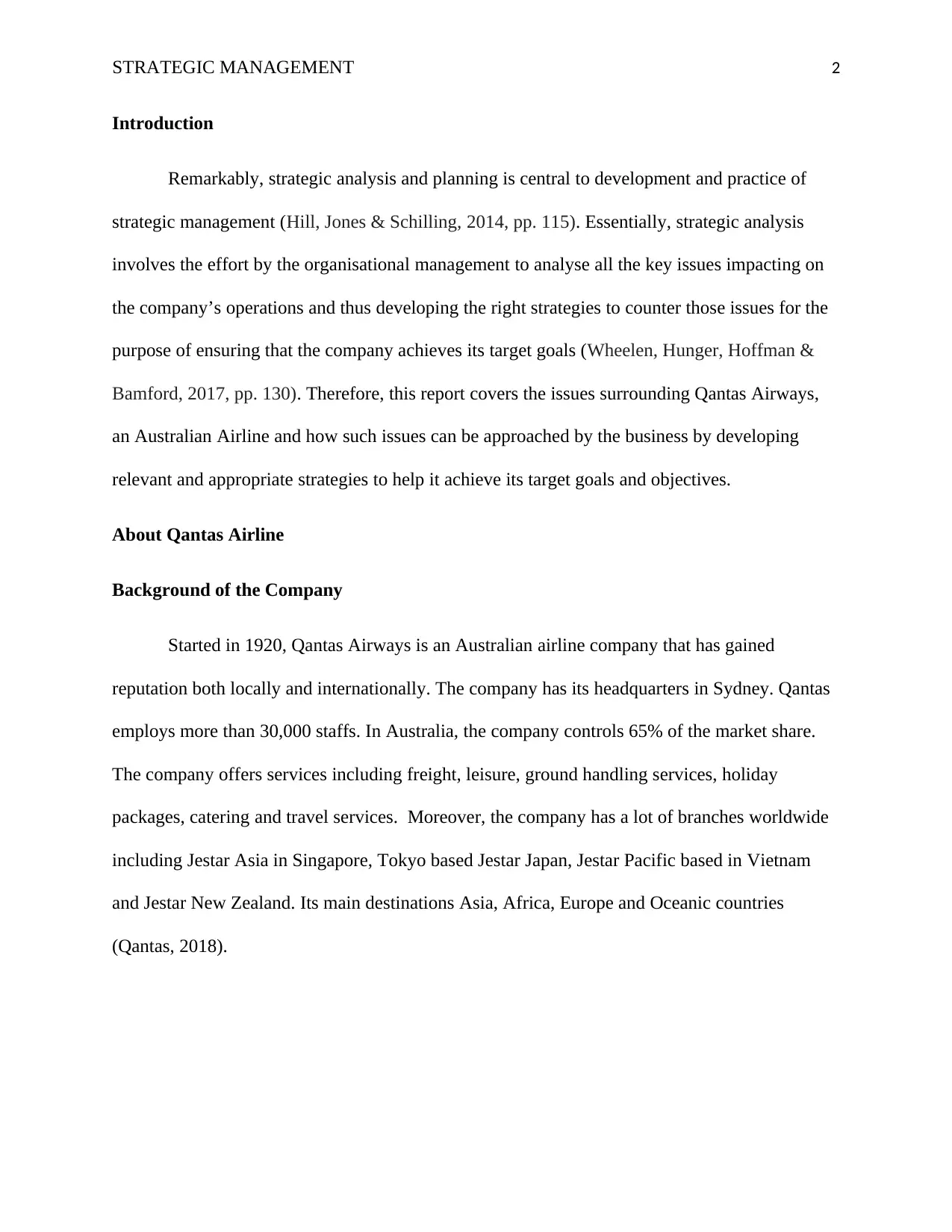
STRATEGIC MANAGEMENT 2
Introduction
Remarkably, strategic analysis and planning is central to development and practice of
strategic management (Hill, Jones & Schilling, 2014, pp. 115). Essentially, strategic analysis
involves the effort by the organisational management to analyse all the key issues impacting on
the company’s operations and thus developing the right strategies to counter those issues for the
purpose of ensuring that the company achieves its target goals (Wheelen, Hunger, Hoffman &
Bamford, 2017, pp. 130). Therefore, this report covers the issues surrounding Qantas Airways,
an Australian Airline and how such issues can be approached by the business by developing
relevant and appropriate strategies to help it achieve its target goals and objectives.
About Qantas Airline
Background of the Company
Started in 1920, Qantas Airways is an Australian airline company that has gained
reputation both locally and internationally. The company has its headquarters in Sydney. Qantas
employs more than 30,000 staffs. In Australia, the company controls 65% of the market share.
The company offers services including freight, leisure, ground handling services, holiday
packages, catering and travel services. Moreover, the company has a lot of branches worldwide
including Jestar Asia in Singapore, Tokyo based Jestar Japan, Jestar Pacific based in Vietnam
and Jestar New Zealand. Its main destinations Asia, Africa, Europe and Oceanic countries
(Qantas, 2018).
Introduction
Remarkably, strategic analysis and planning is central to development and practice of
strategic management (Hill, Jones & Schilling, 2014, pp. 115). Essentially, strategic analysis
involves the effort by the organisational management to analyse all the key issues impacting on
the company’s operations and thus developing the right strategies to counter those issues for the
purpose of ensuring that the company achieves its target goals (Wheelen, Hunger, Hoffman &
Bamford, 2017, pp. 130). Therefore, this report covers the issues surrounding Qantas Airways,
an Australian Airline and how such issues can be approached by the business by developing
relevant and appropriate strategies to help it achieve its target goals and objectives.
About Qantas Airline
Background of the Company
Started in 1920, Qantas Airways is an Australian airline company that has gained
reputation both locally and internationally. The company has its headquarters in Sydney. Qantas
employs more than 30,000 staffs. In Australia, the company controls 65% of the market share.
The company offers services including freight, leisure, ground handling services, holiday
packages, catering and travel services. Moreover, the company has a lot of branches worldwide
including Jestar Asia in Singapore, Tokyo based Jestar Japan, Jestar Pacific based in Vietnam
and Jestar New Zealand. Its main destinations Asia, Africa, Europe and Oceanic countries
(Qantas, 2018).
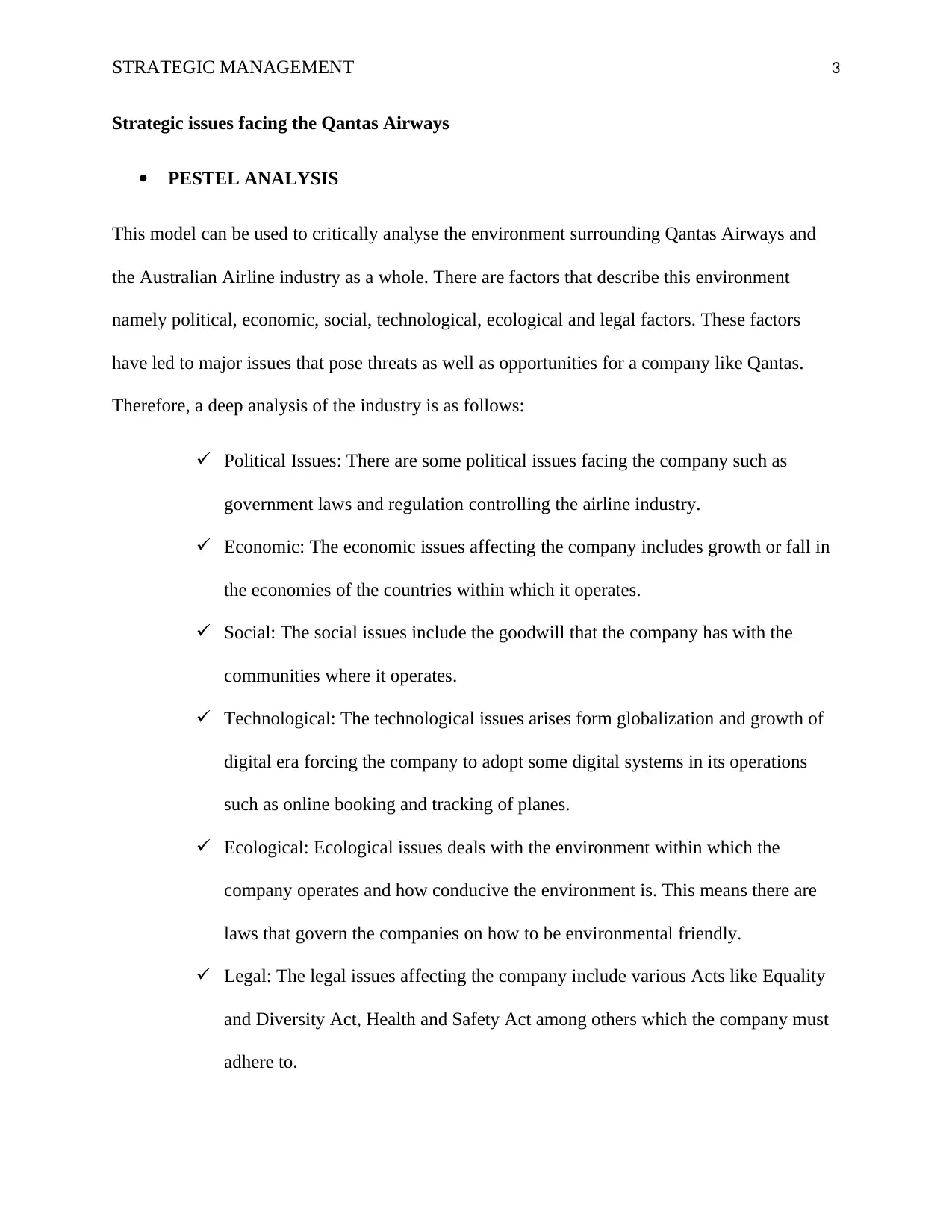
STRATEGIC MANAGEMENT 3
Strategic issues facing the Qantas Airways
PESTEL ANALYSIS
This model can be used to critically analyse the environment surrounding Qantas Airways and
the Australian Airline industry as a whole. There are factors that describe this environment
namely political, economic, social, technological, ecological and legal factors. These factors
have led to major issues that pose threats as well as opportunities for a company like Qantas.
Therefore, a deep analysis of the industry is as follows:
Political Issues: There are some political issues facing the company such as
government laws and regulation controlling the airline industry.
Economic: The economic issues affecting the company includes growth or fall in
the economies of the countries within which it operates.
Social: The social issues include the goodwill that the company has with the
communities where it operates.
Technological: The technological issues arises form globalization and growth of
digital era forcing the company to adopt some digital systems in its operations
such as online booking and tracking of planes.
Ecological: Ecological issues deals with the environment within which the
company operates and how conducive the environment is. This means there are
laws that govern the companies on how to be environmental friendly.
Legal: The legal issues affecting the company include various Acts like Equality
and Diversity Act, Health and Safety Act among others which the company must
adhere to.
Strategic issues facing the Qantas Airways
PESTEL ANALYSIS
This model can be used to critically analyse the environment surrounding Qantas Airways and
the Australian Airline industry as a whole. There are factors that describe this environment
namely political, economic, social, technological, ecological and legal factors. These factors
have led to major issues that pose threats as well as opportunities for a company like Qantas.
Therefore, a deep analysis of the industry is as follows:
Political Issues: There are some political issues facing the company such as
government laws and regulation controlling the airline industry.
Economic: The economic issues affecting the company includes growth or fall in
the economies of the countries within which it operates.
Social: The social issues include the goodwill that the company has with the
communities where it operates.
Technological: The technological issues arises form globalization and growth of
digital era forcing the company to adopt some digital systems in its operations
such as online booking and tracking of planes.
Ecological: Ecological issues deals with the environment within which the
company operates and how conducive the environment is. This means there are
laws that govern the companies on how to be environmental friendly.
Legal: The legal issues affecting the company include various Acts like Equality
and Diversity Act, Health and Safety Act among others which the company must
adhere to.
⊘ This is a preview!⊘
Do you want full access?
Subscribe today to unlock all pages.

Trusted by 1+ million students worldwide
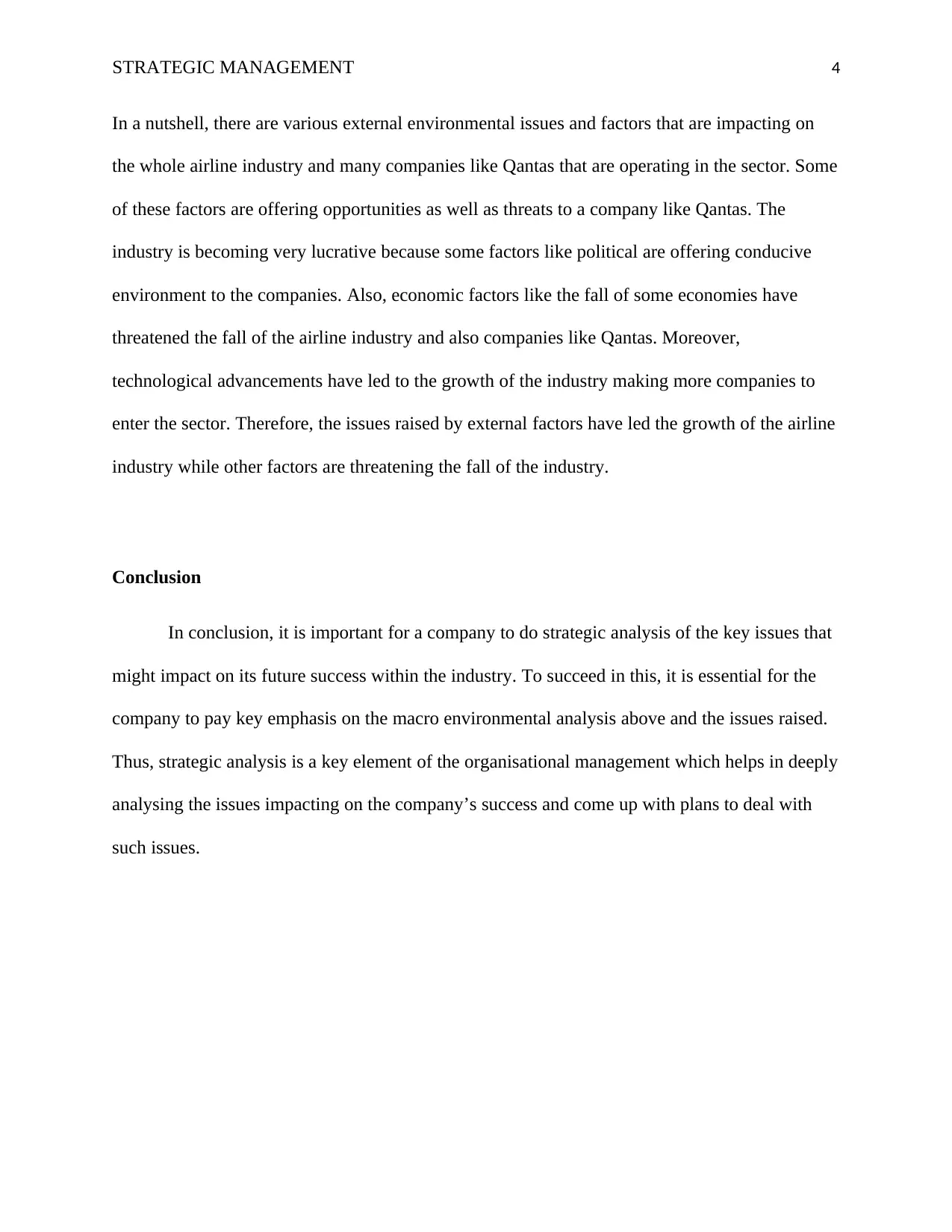
STRATEGIC MANAGEMENT 4
In a nutshell, there are various external environmental issues and factors that are impacting on
the whole airline industry and many companies like Qantas that are operating in the sector. Some
of these factors are offering opportunities as well as threats to a company like Qantas. The
industry is becoming very lucrative because some factors like political are offering conducive
environment to the companies. Also, economic factors like the fall of some economies have
threatened the fall of the airline industry and also companies like Qantas. Moreover,
technological advancements have led to the growth of the industry making more companies to
enter the sector. Therefore, the issues raised by external factors have led the growth of the airline
industry while other factors are threatening the fall of the industry.
Conclusion
In conclusion, it is important for a company to do strategic analysis of the key issues that
might impact on its future success within the industry. To succeed in this, it is essential for the
company to pay key emphasis on the macro environmental analysis above and the issues raised.
Thus, strategic analysis is a key element of the organisational management which helps in deeply
analysing the issues impacting on the company’s success and come up with plans to deal with
such issues.
In a nutshell, there are various external environmental issues and factors that are impacting on
the whole airline industry and many companies like Qantas that are operating in the sector. Some
of these factors are offering opportunities as well as threats to a company like Qantas. The
industry is becoming very lucrative because some factors like political are offering conducive
environment to the companies. Also, economic factors like the fall of some economies have
threatened the fall of the airline industry and also companies like Qantas. Moreover,
technological advancements have led to the growth of the industry making more companies to
enter the sector. Therefore, the issues raised by external factors have led the growth of the airline
industry while other factors are threatening the fall of the industry.
Conclusion
In conclusion, it is important for a company to do strategic analysis of the key issues that
might impact on its future success within the industry. To succeed in this, it is essential for the
company to pay key emphasis on the macro environmental analysis above and the issues raised.
Thus, strategic analysis is a key element of the organisational management which helps in deeply
analysing the issues impacting on the company’s success and come up with plans to deal with
such issues.
Paraphrase This Document
Need a fresh take? Get an instant paraphrase of this document with our AI Paraphraser
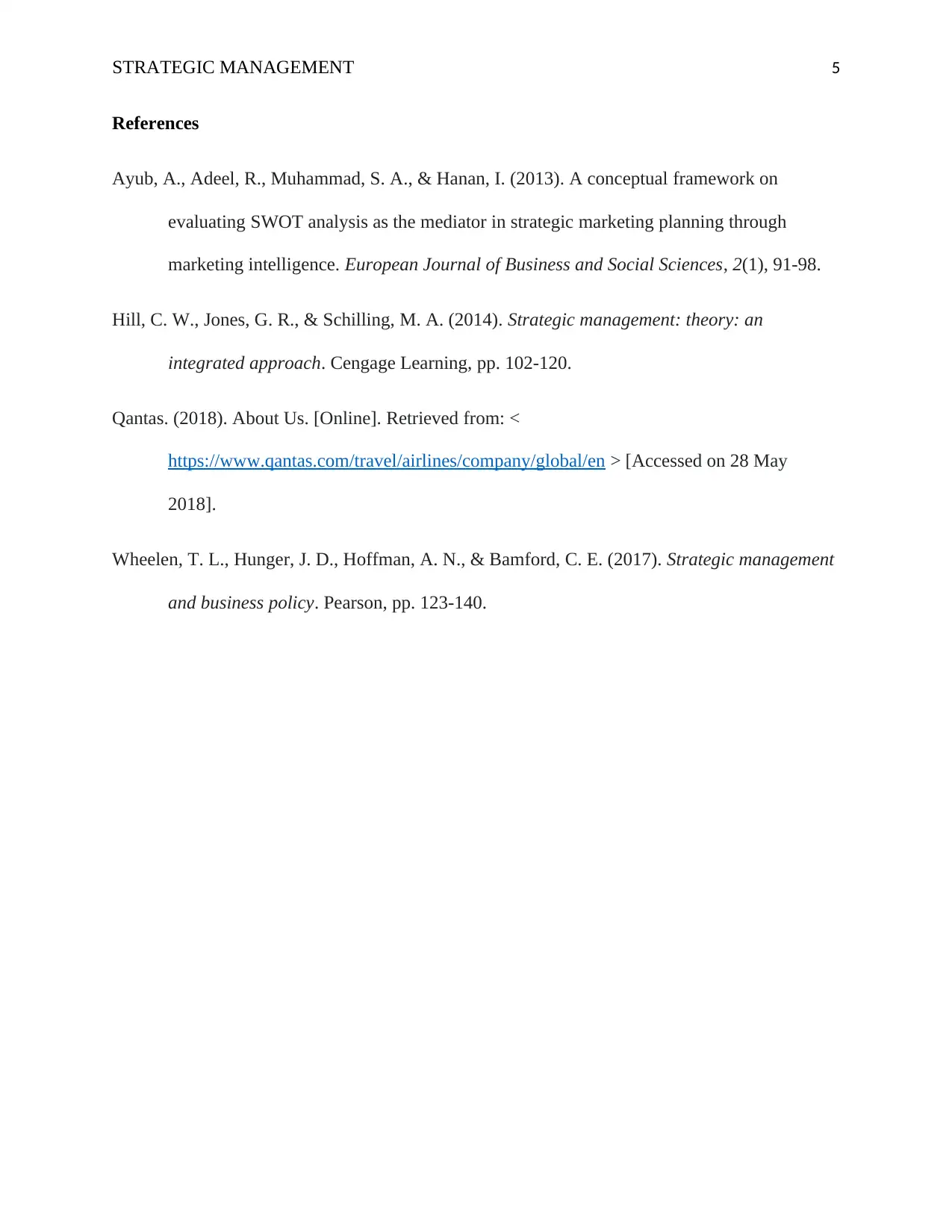
STRATEGIC MANAGEMENT 5
References
Ayub, A., Adeel, R., Muhammad, S. A., & Hanan, I. (2013). A conceptual framework on
evaluating SWOT analysis as the mediator in strategic marketing planning through
marketing intelligence. European Journal of Business and Social Sciences, 2(1), 91-98.
Hill, C. W., Jones, G. R., & Schilling, M. A. (2014). Strategic management: theory: an
integrated approach. Cengage Learning, pp. 102-120.
Qantas. (2018). About Us. [Online]. Retrieved from: <
https://www.qantas.com/travel/airlines/company/global/en > [Accessed on 28 May
2018].
Wheelen, T. L., Hunger, J. D., Hoffman, A. N., & Bamford, C. E. (2017). Strategic management
and business policy. Pearson, pp. 123-140.
References
Ayub, A., Adeel, R., Muhammad, S. A., & Hanan, I. (2013). A conceptual framework on
evaluating SWOT analysis as the mediator in strategic marketing planning through
marketing intelligence. European Journal of Business and Social Sciences, 2(1), 91-98.
Hill, C. W., Jones, G. R., & Schilling, M. A. (2014). Strategic management: theory: an
integrated approach. Cengage Learning, pp. 102-120.
Qantas. (2018). About Us. [Online]. Retrieved from: <
https://www.qantas.com/travel/airlines/company/global/en > [Accessed on 28 May
2018].
Wheelen, T. L., Hunger, J. D., Hoffman, A. N., & Bamford, C. E. (2017). Strategic management
and business policy. Pearson, pp. 123-140.
1 out of 5
Related Documents
Your All-in-One AI-Powered Toolkit for Academic Success.
+13062052269
info@desklib.com
Available 24*7 on WhatsApp / Email
![[object Object]](/_next/static/media/star-bottom.7253800d.svg)
Unlock your academic potential
Copyright © 2020–2026 A2Z Services. All Rights Reserved. Developed and managed by ZUCOL.





